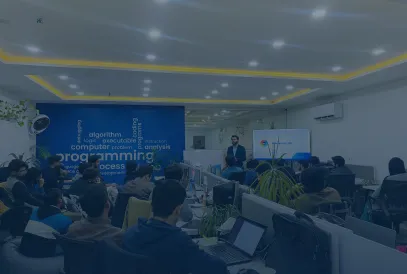What does it take to assemble a group of individuals into a high-performing software development team that consistently delivers exceptional results?
Every app you love, every seamless platform you rely on, and every game-changing software solution that has transformed industries began with a group of talented individuals working in harmony.
But here's the catch – assembling such a team is easier said than done. It's akin to putting together a puzzle with pieces that have to fit and complement each other perfectly. So, the million-dollar question is, how to build a successful software development team? We’ll answer this question in today’s article.
How to Build a Successful Software Development Team
Building a Successful Software Development Team
Before answering how to build a successful software development team, it’s crucial to understand what such a team entails.
The team combines a group of individuals who come together to design, create, and maintain software products to meet and exceed the intended goals. Such a team should possess a diverse skill set, technical and non-technical skills, communication abilities, and a shared commitment to deliver exceptional results.
Listed below are the key attributes that define a successful software development team:
- The team must be skilled in different programming languages, development tools, and other domain expertise relevant to the project. It helps the team to effectively approach the various aspects of software development.
- Each team member should have a clear role or responsibility assigned. It minimizes confusion, avoids duplication of effort and ensures everyone understands their contribution to the project.
- Everyone should possess strong communication skills to express their ideas openly, provide feedback and collaborate with the team. It prevents misunderstandings and keeps everyone aligned with the project goals.
- The landscape in software development evolves more often than others. Therefore, having a team that can adopt the changing dynamics, such as new technologies and frameworks, is essential for the project’s success.
- The team should prioritize quality over quantity by following the best coding, testing and debugging practices. The end goal should always be to produce user-friendly and defect-free software.
- The team should be good at project management, planning, organizing, and monitoring progress to ensure the project goes smoothly.
- Team members should know how to manage time efficiently, prioritize tasks and avoid unnecessary delays to meet project milestones and deadlines.
- Regardless of their goal, each member should understand the needs and expectations of end-users and develop software solutions that align with those requirements.
How should you compose a successful software development team? What roles to include?
A software development team comprises members with diverse roles and responsibilities to ensure software product design, development, testing, and deployment.
While team structures can vary depending on the project's complexity and size, here are some common roles and their responsibilities:
Project Manager (PM):
- Responsible for properly planning, scheduling, budgeting and executing the project.
- Manages project scope, risks, and resources.
- Facilitates communication between team members and stakeholders.
- Ensures that the project stays on track and meets its objectives.
Product Owner (PO):
- Represent stakeholder’s and user’s interests
- Defines and prioritizes the product backlog
- Ensures user stories and requirements are clear and well-understood by the team.
Scrum Master:
- Facilitates Agile development processes (e.g., Scrum or Kanban).
- Helps the team stay organized, focused, and productive.
- Removes obstacles and impediments that hinder progress.
- Ensures the team follows Agile principles and best practices.
UX/UI Designer:
- Designs the user interface and user experience of the software.
- Creates wireframes, mockups, and prototypes.
- Collaborates with developers to implement designs effectively.
- Ensures a user-friendly and visually appealing product.
Developers/Engineers:
- Write code based on specifications and user stories.
- Collaborate with other team members to integrate their work.
- Write automated tests and conduct code reviews.
- Maintain and refactor code as needed for quality and maintainability.
Quality Assurance (QA) Engineer/Tester:
- Develops test plans and test cases.
- Conducts testing, such as unit testing, integration testing, and user acceptance testing.
- Reports and tracks defects and works with developers to resolve issues.
- Ensures the software meets quality standards and is bug-free.
Technical Writers (if applicable):
- Creates documentation for end-users, developers, and administrators.
- Ensures that users can understand and effectively use the software.
If you’re wondering what should be the ideal size of your software development team, then it depends. What is your project’s scope, and how complex it is?
However, if you’re following the typical Agile development approach, your team should be based on the Scrum framework, which suggests a small, cross-functional team of 5 to 9 members.
Ultimately, the ideal team size and structure should be tailored to the specific project's needs and the organization's capabilities while maintaining effective communication and collaboration among team members.
10 Best Practices to Follow for Building a Successful Software Development Team
Now that you know what essential member your team should compose, it’s time to learn some tips to help you build a successful software development team.
- To build a successful team, clearly define the roles and responsibilities of each team member.
- Compose a team with diverse cross-functional skills to minimize dependencies on external teams or specialists.
- Assess candidates not only for their technical skills but also for their alignment with the team's culture and values.
- Encourage regular stand-up meetings, retrospectives, and other Agile practices to maintain transparency and alignment.
- Encourage pair programming and code reviews to improve code quality.
- Invest in ongoing training and skill development for team members.
- The team should understand the project's purpose, objectives, and priorities.
- Foster an autonomous culture for the team to make decisions and take ownership of their work.
- Use Agile practices to adapt to changing requirements and prioritize customer value.
- Appoint a skilled project manager to oversee project planning, scheduling, and resource allocation.
How do you resolve conflicts in a software development team?
Since the team comprises members from various cultures, values and backgrounds, conflicts will likely occur. To address these issues effectively, you should take help from conflict resolution strategies and processes. Firstly, it's essential to acknowledge that a conflict exists and handle it promptly. It’ll not resolve on its own.
Additionally, one-on-one meetings with both parties to actively listen to their concerns and complaints. Ensure that each person understands the other's point of view by summarizing and paraphrasing their statements. While doing so, ensure everyone is respectful and calm and avoid blame, accusations or personal attacks that can lead to a fight.
Conflicts in software development can often be related to differing technical opinions, project priorities, or misaligned goals. Therefore, encourage the parties to identify and articulate the underlying issues that led to the conflict. If the conflict persists or escalates, consider bringing in a neutral third party, such as a team lead, project manager, or HR representative, to mediate the discussion and help find a resolution.
Remember that conflicts are a natural part of any team's dynamics, and when managed effectively, they can lead to better solutions and stronger team relationships. By creating a culture of open communication, active listening, and respectful collaboration, you can minimize conflicts and address them constructively when they arise.
Final thoughts
Great teamwork brings great results, but it takes a lot of effort to bring talented individuals together to work on a common goal harmoniously. You can face challenges as teams may engage in a conflict that can affect the progress of your software development project. However, you can combat these issues by being clear with your requirements regarding the team members, effective conflict resolution strategies and leadership strategies.

















